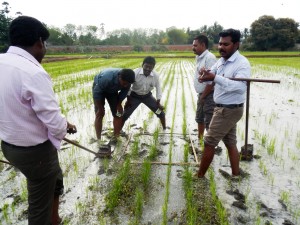Production to Processing: Season-Long Training Started in Tamil Nadu
 Mechanized rice production, including mechanized drill seeding, has the potential to improve yields and reduce labor demand in Tamil Nadu. Because mechanized rice production involves a relatively knowledge-intensive set of practices, extension agents involved in providing support and information must receive proper training. Capacity building efforts for state extension agents are often insufficient and existing training programs sometimes suffer from being either too theoretical or narrowly focused on a small window of the cropping cycle.
Mechanized rice production, including mechanized drill seeding, has the potential to improve yields and reduce labor demand in Tamil Nadu. Because mechanized rice production involves a relatively knowledge-intensive set of practices, extension agents involved in providing support and information must receive proper training. Capacity building efforts for state extension agents are often insufficient and existing training programs sometimes suffer from being either too theoretical or narrowly focused on a small window of the cropping cycle.
To provide a comprehensive and hands-on training experience and to build capacity within the state extension system, Tamil Nadu Agriculture University (TNAU) and CSISA are piloting a season-long training course at the Needamangalam Krishi Vigyan Kendra (farm science center) in Thiruvarur District. The training will cover all aspects of growing drill-seeded rice (DSR). Course materials have been fine-tuned and adapted to the specific conditions of Tamil Nadu in a joint workshop by TNAU and CSISA staff.
The training program covers 13 major steps for successful rice production, from crop planning to milling to processing. The course is composed of 10 training days spread across the production cycle of rice and includes classroom sessions as well as practical exercises and applications in the field.
The beginning of the curriculum includes an overview of rice ecosystems, rice morphology and the cropping calendar, followed by a field-based introduction to laser land leveling. Subsequent modules focus on land preparation, farm power and tractor operation and maintenance and are followed by exercises on crop planning, financial management and matching equipment to farm size. Students will then prepare land for DSR. The next steps include practical exercises on seed quality measurement, seed drill calibration and sowing. This will be followed by lessons and exercises on weed and water management and population maintenance. The emergence of the crop will be monitored, emerging weeds identified and the post-emergency herbicide applied. The next training day will focus on nutrient management of rice with an introduction to the nutrient requirements and deficiency symptoms of rice, site-specific nutrient management, Leaf Color Chart and Nutrient Manager. Additional lessons cover insects, rodents and diseases in rice and their control, pesticide safety, knapsack sprayer use, etc. Harvest day will see students taking yield measurements, harvesting, threshing and drying rice. Practical exercises on assessing grain quality will be done with the IRRI Rice Quality Assessment Kit. The course will culminate on 29 January 2015 with an excursion to a modern rice mill after lessons on rice storage, milling and processing as well as a practical introduction to the ‘Superbag’ and ‘Cocoon’ as hermetic storage systems.
As a next step, CSISA also plans to introduce the season-long training concept in Odisha with a focus on mechanical transplanting of rice.
Tags: Tamil Nadu, Training
